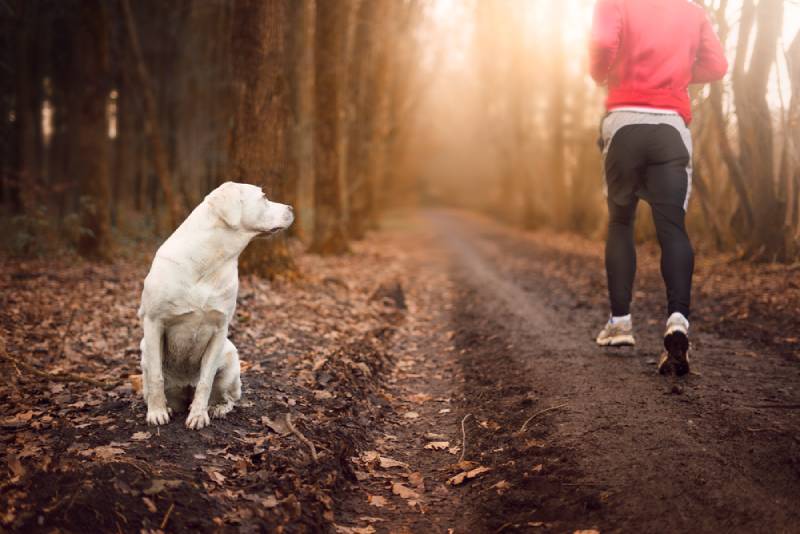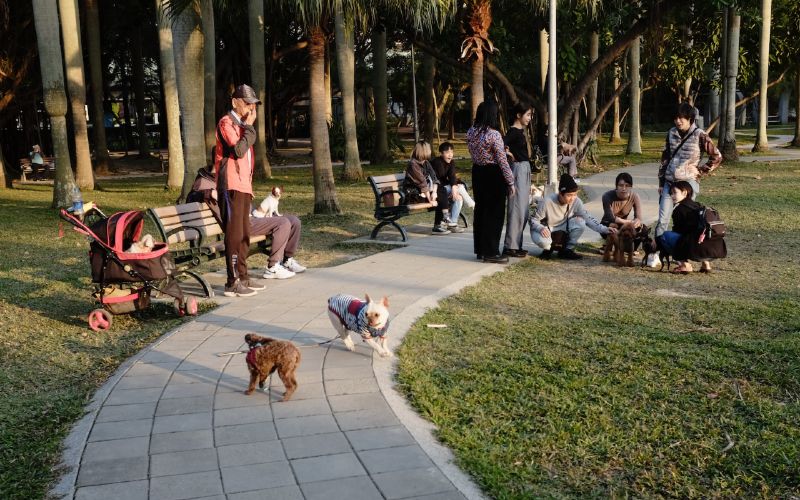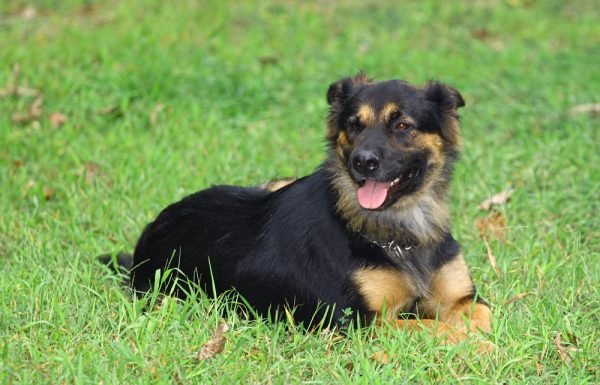In this article
View 4 More +Navigating through a world with curious, sometimes overly assertive dogs can be quite an adventure. Whether you’re out for a leisurely stroll or a brisk morning jog, encountering an aggressive dog can be a daunting experience.
But don’t fret! We’re providing you with a comprehensive guide filled with helpful steps and suggestions on how to handle such situations without harm to you or the dog.
Preparation Is Key
Oftentimes, taking the time to plan ahead can do wonders for how you react to scary situations. So, before you head out the door, make sure you’re properly prepared.
1. Educate Yourself About Dogs
As in many situations, knowledge is power. Understanding canine behavior forms the bedrock of your preparation. Dogs, like humans, have their language. Their primary means of communication is body language and being able to decode this can give you a leg up.
For instance, when a dog is growling or baring its teeth, it is displaying clear signs of aggression. Other indicators could be subtler, such as a stiff tail or flattened ears.
Sometimes, however, we may misinterpret boisterous or over-excited behavior as aggression, so being able to recognize aggression from poor socialization is important, as it will change the way we should react.

2. Carry Dog Repellents
There’s a wide selection of non-lethal dog repellents that you can use to maintain a safe distance from an aggressive dog. Ultrasonic devices emit a high-pitched sound that’s irritating to dogs but inaudible to humans.
Other options include specially formulated pepper sprays for animals that can help deter a dog without causing long-term harm. Make sure you know how to use your chosen tool effectively and can access it quickly if needed.
3. Wear Appropriate Clothing
Dressing right is an often-overlooked aspect of preparation. Avoid wearing loose or flapping clothes that might attract a dog’s attention or give them something to grab onto. Opt instead for fitted clothes that won’t restrict your movement.
Similarly, sturdy shoes that offer protection and allow quick movement are a must. It’s all about reducing risk and maximizing your ability to respond if a dog approaches you.

Actions During the Encounter
The hardest part of being confronted by an aggressive dog is knowing how to react. When the adrenalin takes over, it’s hard to think straight, so having a plan in your head will help you respond as safely as you can.
1. Stay Calm
Your emotions can influence a dog’s behavior. Dogs have a keen sense of fear and anxiety. If a dog approaches you, strive to maintain your composure. Keep your breathing steady and your movements slow and deliberate. Avoid direct eye contact, as dogs may perceive this as a challenge or threat.
Do not scream or shriek as this can send both dogs into a dangerous frenzy. If possible, try to attract the attention of anyone nearby, but do not shout or wave your arms.

2. Command Firmly
Dogs are trained to respond to commands. Use this to your advantage. In a deep, firm voice, command the dog to back off. Simple, clear words such as “No,” “Back,” or “Stay” can work wonders.
Most dogs are familiar with these basic commands, and even if the dog hasn’t been trained, the assertive tone can be enough to make it hesitate. Use a deep, firm voice.
3. Slow and Steady Movements
While your instincts might be telling you to run, this is the fastest way to get an aggressive dog to give chase. Cross your arms and slowly turn to the side, but do not put your back to them. If they don’t move toward you, start to slowly back away.

4. Create a Barrier
If a dog approaches, try to place an object between you and the dog. It could be a stick, your bag, a bicycle, or anything else at hand. This barrier can discourage the dog from getting too close and give you extra space and time to react.
5. Act According to Size
If you are being chased or confronted by a small, aggressive dog, using a loud, booming voice and taking some assertive steps toward it may be enough to send it on its way. However, any dog that is taller than your knee, has a large head and jaws, or has any risk of carrying rabies, should be treated with extreme caution.
6. Throw Something
If you have a dog toy, treats, water bottle, or a stick, try to get the dog’s attention and distract it by throwing it. They might decide to chase it, or it might distract them enough for you to move a safer distance away.
7. Use Your Repellent
This is when your repellent comes into play. Aim for the dog’s nose and eyes – these are the most sensitive areas. Whether you’re using an ultrasonic device or a pepper spray, ensure that you’re not harming anyone else in the vicinity.


What if the Dog Attacks?
If you have a jacket or scarf, try to throw it over the dog’s head. Unless you are Usain Bolt, do not run. If the dog attacks, the best thing to do is curl up into a ball with your arms behind your head, protecting your neck. Difficult though it may be, try not to make a sound as this will only fuel their attack.
What if My Dog Is With Me?
If you are confronted by an aggressive dog while walking your own dog, the whole situation can become a lot more dangerous and unpredictable. If your dog is small enough, pick them up and hold them closely to your chest, but be very careful as they may act out of character if they feel threatened.
If you have a larger dog, try to maneuver them so they are not facing the aggressive dog.
Again, it is really important not to scream or shriek as this can send both dogs into a dangerous frenzy. It is better to make no sound than to scream.
After the Encounter
To wrap up things, let’s talk about what you should do if you have an unfortunate encounter with an inhospitable dog.
1. Report the Incident
If the dog is clearly a pet and shows aggressive behavior, consider reporting the incident to local authorities or the owner (if known). But try to be reasonable in this regard, too. If you encroached on the dog’s territory and it merely barked at you, such a reaction is understandable.
But if a dog gave you chase in an aggressive manner while you were simply walking down the sidewalk or road, you might want to consider taking things a step further.

2. Assess Any Injuries
If you’ve been bitten or scratched, clean the wound immediately and seek medical attention. There’s always a risk of the dog carrying a disease that could harm you, so don’t delay in consulting with a medical specialist.
3. Reflect on the Experience
Think about what worked and what didn’t during the encounter. This self-reflection can help better prepare for future encounters. For instance, were you able to retrieve your repellant in a fast and efficient manner? What could you do to improve your time?
Did you speak sternly enough, or do you need practice in this area? While it might be difficult to recollect events after such a nerve-racking incident, try your best. Even if you only remember small details, they can come in handy later.


Useful Tips to Remember
Even if your memory is fuzzy about the encounter you experienced, we have some valuable tips to help you out if it happens again.
- Respect the Dog’s Space: Encroaching upon a dog’s territory may provoke it. Try to give a wide berth to any dogs you encounter. If you encounter a barking dog in the future, use it as a warning to create space.
- Don’t Run: While it might feel like second nature to get away as quickly as possible, don’t—running can trigger a dog’s chase instinct. As such, it’s better to move slowly and steadily away.
- Avoid Sudden Movements: Dogs see and perceive things much differently than we do. Due to this, quick, jerky movements can cause them to alarm, potentially triggering an attack. Always remember to move calmly and predictably. If you don’t get it right the first time you have a run-in with a scary dog, don’t give up. If you stick with it and strive to improve your response, you will eventually be an expert at handling these scary scenarios. You can do it!

Final Thoughts
Encountering an aggressive dog can be quite a traumatic experience. But if you keep these steps in mind, your next walk will hopefully be a bit less stressful!
Remember, the goal isn’t to harm the dog but rather to protect yourself while at the same time ensuring the safety and well-being of the dog. Being well-prepared and knowing what to do in these situations can make all the difference.
- See also: Ultrasonic Dog Repellers & Deterrents
Featured Image Credit: MChe Lee, Unsplash




















